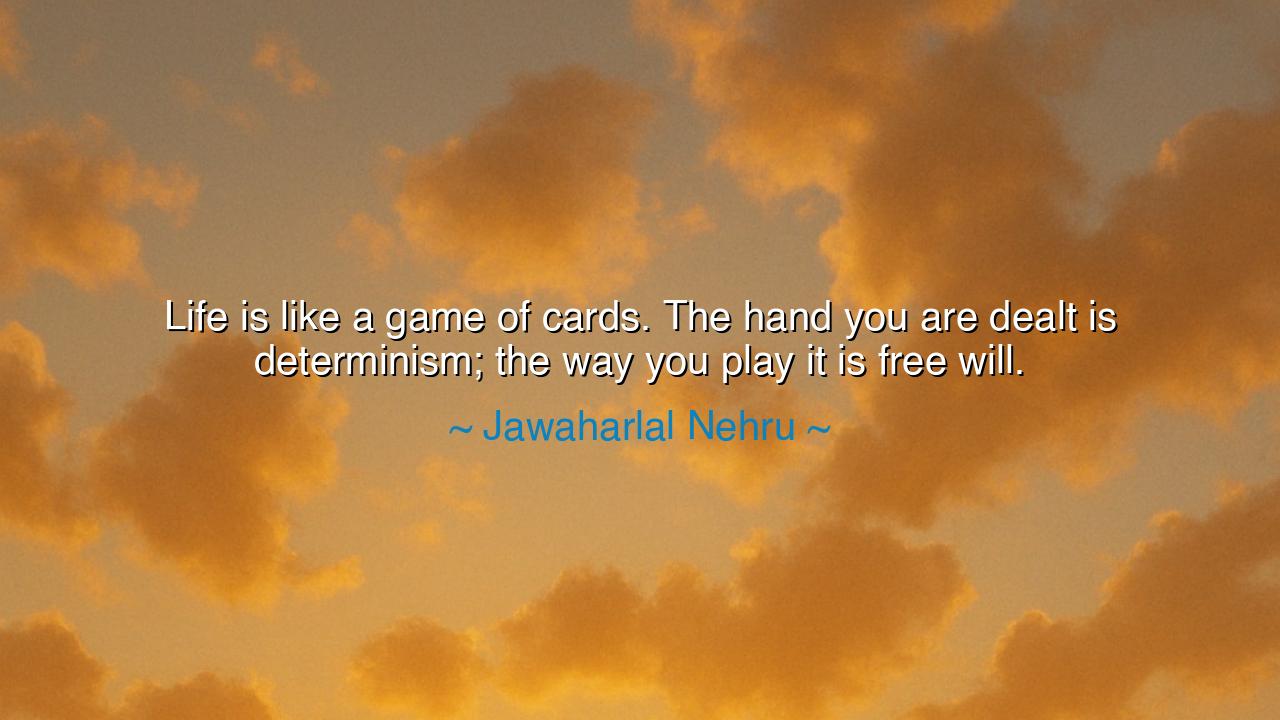
Life is like a game of cards. The hand you are dealt is
Life is like a game of cards. The hand you are dealt is determinism; the way you play it is free will.






"Life is like a game of cards. The hand you are dealt is determinism; the way you play it is free will." These words from Jawaharlal Nehru capture a timeless and profound truth about the nature of fate, choice, and personal agency. Nehru’s metaphor suggests that life, like a game, involves forces beyond our control — the cards we are dealt — but it is how we play those cards that defines our path and character. The concept of determinism holds that certain aspects of our lives — our birth, our circumstances, and certain encounters — are shaped by factors beyond our choosing. But free will, the power to choose how to act in response to those circumstances, gives us the agency to shape our destiny.
The origin of this idea can be found in the ancient debates between fate and free will, concepts that have occupied the minds of philosophers for centuries. The Greeks, for example, believed that fate played a powerful role in shaping human lives, as seen in the stories of Oedipus and the Moirae (the Fates). These gods spun, measured, and cut the threads of human existence, determining much of the course of a person’s life. However, many philosophers, especially the Stoics, recognized that while external forces may shape our circumstances, it is our response to those forces — our free will — that ultimately defines our character and moral worth. Epictetus, the Stoic philosopher, famously taught that while we cannot control the external events of our lives, we have complete control over our responses to them. This ancient wisdom resonates with Nehru’s words, emphasizing the power of choice even within a framework of determinism.
In the life of Alexander the Great, we see a striking example of free will in the face of great determinism. Born into a royal lineage, Alexander was dealt a powerful hand in the game of life. His destiny seemed preordained — he was to be a conqueror, a ruler of vast lands. But how he played his hand, how he chose to wield his power, was entirely up to him. Alexander could have lived a life of comfort, ruling over a peaceful kingdom, but instead, he chose to lead his armies to the farthest reaches of the known world, changing the course of history. His choices shaped not only his life, but the fate of entire civilizations. Alexander’s story shows us that free will, the choices we make in the face of our circumstances, has the power to transform not just our personal paths, but the world itself.
Similarly, consider the story of Abraham Lincoln, who was born into humble beginnings and faced tremendous adversity. His early life was shaped by the harshness of poverty and the loss of family members, circumstances that seemed determined by forces beyond his control. Yet, Lincoln’s choices— his decision to educate himself, to stand for justice, and to fight for the abolition of slavery— were his alone. He did not let his deterministic circumstances define him; he chose to act with courage and moral clarity, changing the course of American history. His story echoes Nehru’s metaphor: while Lincoln was dealt a difficult hand, the way he played it — through decisions that reflected his moral vision — made all the difference.
The tension between determinism and free will is not merely theoretical. It is a daily reality we all face. In the choices we make, whether small or monumental, we carve out our futures. We may not choose the family we are born into, the challenges we face, or the society we live in, but we do have the ability to choose how we respond to these forces. Socrates, when he was condemned to death for corrupting the youth of Athens, chose to face his fate with calm acceptance, believing that it was not the events of life that mattered, but the way one responds to them. He demonstrated, in his final moments, the ultimate expression of free will: the choice to live and die with integrity, unshaken by the weight of the world.
The lesson Nehru imparts is clear: while life is full of deterministic forces beyond our control, we are not merely passive players in the game. We have the power to make choices, to shape our character, and to create meaning through how we respond to life’s challenges. This is the essence of free will: the ability to determine the course of our lives through our decisions and actions. Whether we face prosperity or hardship, success or failure, the way we play the hand we are dealt will define our legacy.
To apply this wisdom in our lives, we must practice awareness and responsibility for our choices. When life seems overwhelming, when we feel the weight of circumstances pushing us in a particular direction, we must remind ourselves that our response is within our control. Even in the most difficult of situations, we can choose to respond with courage, integrity, and wisdom. Like Alexander, Lincoln, and Socrates, we must play the hand we are dealt with purpose and resolve, knowing that our free will shapes the world and our place within it. Let us approach life with the understanding that, though we cannot control all aspects of it, we have the power to choose how we will live.






AAdministratorAdministrator
Welcome, honored guests. Please leave a comment, we will respond soon